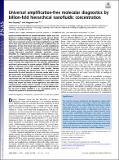Universal amplification-free molecular diagnostics by billion-fold hierarchical nanofluidic concentration
Author(s)
Ouyang, Wei; Han, Jongyoon
DownloadPublished version (2.799Mb)
Publisher Policy
Publisher Policy
Article is made available in accordance with the publisher's policy and may be subject to US copyright law. Please refer to the publisher's site for terms of use.
Terms of use
Metadata
Show full item recordAbstract
Rapid and reliable detection of ultralow-abundance nucleic acids and proteins in complex biological media may greatly advance clinical diagnostics and biotechnology development. Currently, nucleic acid tests rely on enzymatic processes for target amplification (e.g., PCR), which have many inherent issues restricting their implementation in diagnostics. On the other hand, there exist no protein amplification techniques, greatly limiting the development of protein-based diagnosis. We report a universal biomolecule enrichment technique termed hierarchical nanofluidic molecular enrichment system (HOLMES) for amplification-free molecular diagnostics using massively paralleled and hierarchically cascaded nanofluidic concentrators. HOLMES achieves billion-fold enrichment of both nucleic acids and proteins within 30 min, which not only overcomes many inherent issues of nucleic acid amplification but also provides unprecedented enrichment performance for protein analysis. HOLMES features the ability to selectively enrich target biomolecules and simultaneously deplete nontargets directly in complex crude samples, thereby enormously enhancing the signal-to-noise ratio of detection. We demonstrate the direct detection of attomolar nucleic acids in urine and serum within 35 min and HIV p24 protein in serum within 60 min. The performance of HOLMES is comparable to that of nucleic acid amplification tests and near million-fold improvement over standard enzyme-linked immunosorbent assay (ELISA) for protein detection, being much simpler and faster in both applications. We additionally measured human cardiac troponin I protein in 9 human plasma samples, and showed excellent agreement with ELISA and detection below the limit of ELISA. HOLMES is in an unparalleled position to unleash the potential of protein-based diagnosis.
Date issued
2019-07-29Department
Massachusetts Institute of Technology. Department of Electrical Engineering and Computer Science; Massachusetts Institute of Technology. Research Laboratory of Electronics; Massachusetts Institute of Technology. Department of Biological EngineeringJournal
Proceedings of the National Academy of Sciences of the United States of America
Publisher
Proceedings of the National Academy of Sciences
Citation
Ouyang, Wei and Jongyoon Han. "Universal amplification-free molecular diagnostics by billion-fold hierarchical nanofluidic concentration." Proceedings of the National Academy of Sciences of the United States of America 116 (2019): 16240-16249 © 2019 The Author(s)
Version: Final published version
ISSN
0027-8424
1091-6490
Keywords
Multidisciplinary